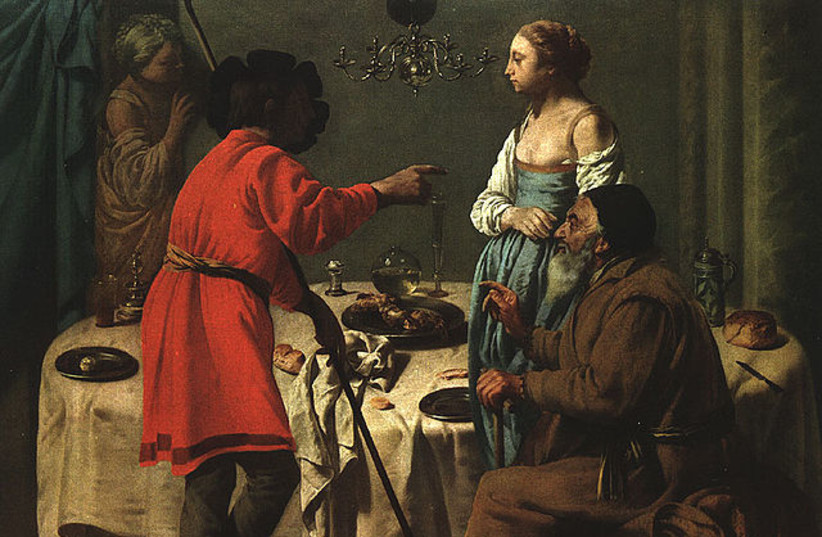In last week’s parasha, we read about Jacob’s being forced to leave his parents’ home in order to escape the wrath of his brother, Esau, who was waiting for an opportunity to take revenge for Jacob’s taking the blessings that had been promised to Esau.
In this week’s parasha, Vayetze, we get into the story of Jacob who wandered to Haran, where his Uncle Laban lived. Jacob lived in Haran for 20 years, through many trials and tribulations.
This chapter in Jacob’s life begins with the deceit from which Jacob suffered his entire life. After he got to Haran and met Laban’s daughter Rachel, he felt she was his soulmate and wanted to marry her. Jacob made a proposal to Laban, as was customary in those days, and agreed to work for Laban for seven years, after which he would be able to marry Rachel. Laban agreed to give Rachel to Jacob. But after the seven years passed, he cheated Jacob and gave him his older daughter, Leah, instead of Rachel. From here on, Jacob’s life became a string of complications and tragedies. After he discovered the deceit, he demanded to marry Rachel, the woman he loved, but Laban demanded an additional seven years of labor. With no choice, Jacob agreed and worked for Laban for another seven years.
Jacob was married to two sisters but loved Rachel more than he loved Leah. This created a rift in his family, with far-reaching implications. The tension between Rachel and Leah is described in the parasha. It intensified after Leah gave birth to child after child, whereas the beloved Rachel was unable to bear children. Only after Leah had six sons did Rachel get pregnant and give birth to Joseph.

After Joseph was born, Jacob decided to leave Haran and return to his parents’ home in the Land of Canaan. Laban was not amenable, and Jacob was forced to stay in Haran for years more. Even when he finally was able to escape with his family and possessions, Laban chased him and tried to kill him. Only divine intervention prevented the tragedy.
What kept Jacob going?
WHAT KEPT Jacob going during those long and difficult years, when he was alone, far from his parents’ home, being swindled and threatened time after time by his father-in-law?
To answer that, we must go back to the start of Jacob’s journey from the Land of Canaan to Haran. When he was on his way, he went to sleep for the night in a place called Beit El (the House of God). Our sages tell us that this was on the Temple Mount, the site where the Temple would be built years later. There, Jacob dreamed an amazing dream. He saw in his dream “a ladder set up on the ground and its top reached to heaven; and behold, angels of God were ascending and descending upon it.”
Many interpretations of this vision have been offered by commentators. According to some of them, the dream symbolizes the connection between heaven and Earth, the possibility of a person living a secular and sacred life simultaneously, and the human capacity to bridge the gaps between heaven and Earth.
Jacob embarked on his life journey equipped with these understandings. He knew that even when he was living in a foreign land, alone and vulnerable to deceit, there was meaning to his life and his actions. He learned that even when we feel we’re at the bottom of a pit, we are not disconnected from heaven. He believed that a person can be standing on Earth but his head could reach the heavens.
He also recognized that the ups and downs in his private life were not merely mishaps but were part of a complex plan in which he played a part. He saw angels going up and down the ladder and inferred that he, too, could be like that – descending and then going back up; never staying down but always climbing back up that ladder leading to heaven.
When Jacob woke up, he cried out, “How awesome is this place! This is none other than the house of God, and this is the gate of heaven.”
If we listen closely to these words, we learn two aspects of the connection between heaven and Earth, between the sacred and the mundane. On the one hand, Jacob discovered that this earthly site is actually “the house of God.” God resides on Earth. He is not unattainable and distant. On the other hand, Jacob discovered that the place was “the gate of heaven” – the gate between Earth and heaven. Jacob discovered the connection between heaven and Earth from both sides, enabling him to cope with his distant exile while equipped with faith and confidence, hope and significance. ■
The writer is rabbi of the Western Wall and other holy sites.
